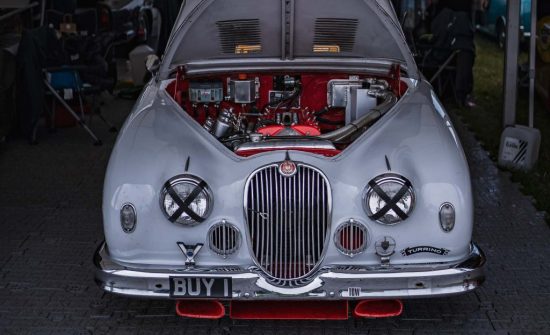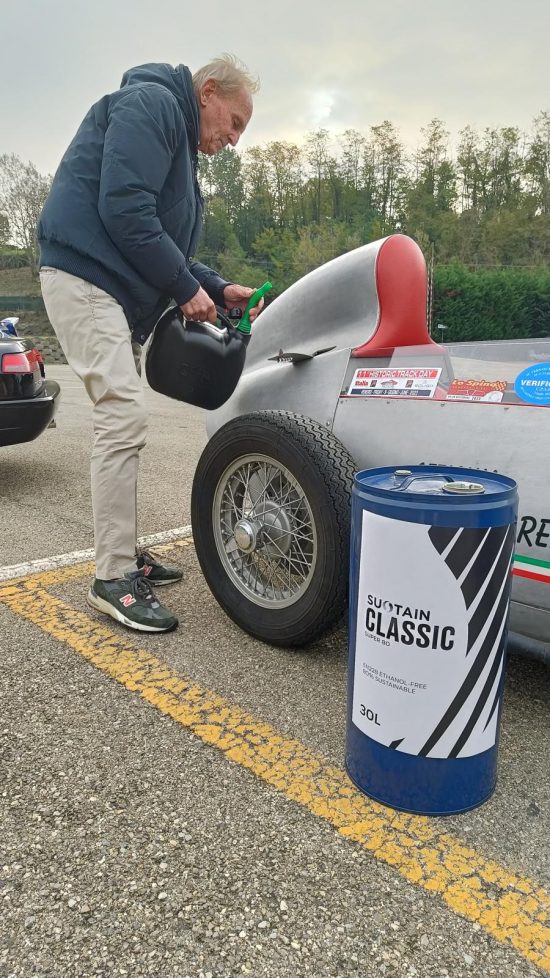While racing and classic car fuels are both specialised solutions, technically tailored for the vehicles they power, they serve very different purposes and are formulated accordingly.
In this article, we’ll explore each of the categories in more detail, and we’ll outline the qualities that set them apart. We’ll also introduce you to our own sustainable solutions for these sectors, SUSTAIN Racing and SUSTAIN Classic.
An introduction to the race and classic fuels categories
Whilst every fuel will vary, depending on the provider creating it and the brief it’s blended to meet, there are common characteristics that define the race and classic fuel categories.
What is race fuel?
Generally speaking, race fuel is a high-performance solution specifically formulated to power racing engines. It enables them to operate at peak efficiency and power output under extreme conditions. Unlike regular pump fuel, race fuel is designed to resist pre-ignition or knocking in high-compression, high-revving engines that are common in motorsports.
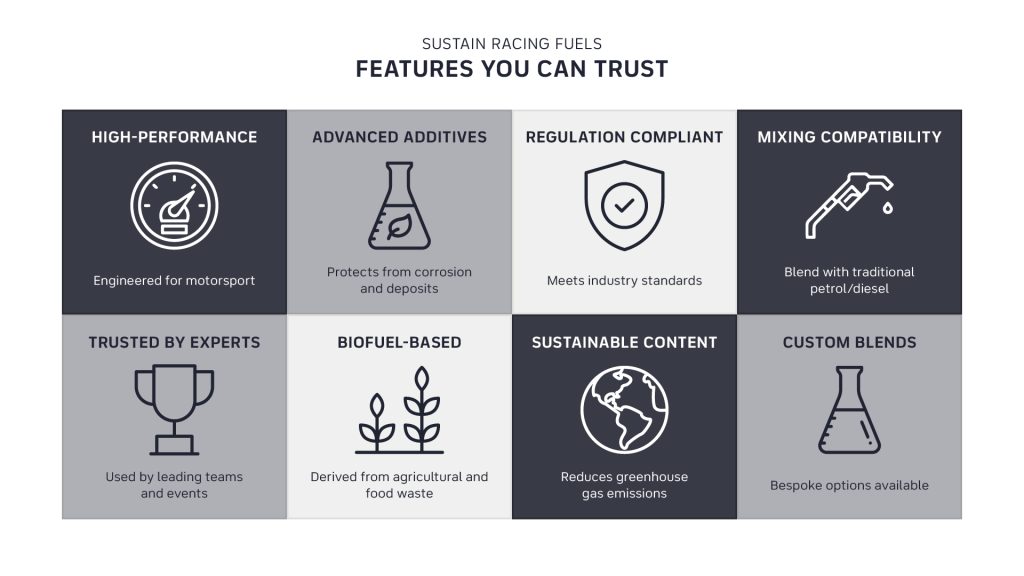
What is classic fuel?
Classic car fuel is designed for older vehicles, typically manufactured before modern fuel formulations became standard. These cars often have lower-compression engines, and their components are incompatible with today’s ethanol-blended or unleaded fuels. As such, many vintage car fuels contain lead substitutes or additives to prevent wear on critical engine parts. Additionally, these fuels are often ethanol-free, as ethanol can degrade rubber seals, gaskets, and fuel lines in older engines, causing corrosion or performance issues.
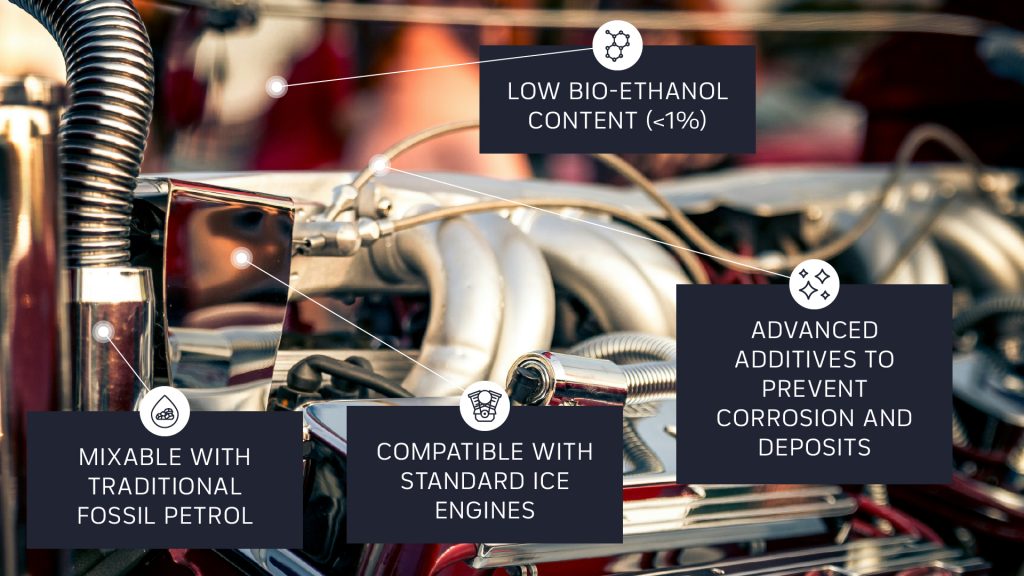
An introduction to SUSTAIN Racing and Classic fuels
At SUSTAIN, we create fuels that move us forward. So, when we set out to create dedicated ranges for the racing and classic fuel markets, we decided to do things differently. Using our market-leading research facility and in-house expertise, we developed sector solutions that not only delivered on the technical requirements but utilised the power of sustainable fuel too.
What is SUSTAIN Racing fuel?
SUSTAIN Racing fuel delivers all the power and performance required in the motorsport sector, alongside significant greenhouse gas savings compared to traditional fossil fuels. Featuring advanced second-generation biofuel, it harnesses the power of plants to recycle carbon that already exists in our atmosphere for its production, rather than unlocking the carbon stored underground like fossil fuels.
The core SUSTAIN Racing range includes eight biofuel-based products, with bespoke formulations available on request. From motorbiking blends such as SUSTAIN Racing Moto 40 to the universal SUSTAIN Racing Diesel 100 that works in generators, cars, trucks and boats, it caters to many users.
What is SUSTAIN Classic fuel?
SUSTAIN Classic fuel allows veteran, vintage and classic vehicle owners, and the wider driving community, to care for their cars and the planet. Technically tailored for older engines, the fuels offer an octane number >98 and bio-ethanol content of <1%. It also includes a premium additive package which stabilises and extends the life of the fuel, whilst helping to clean and protect the engine. Compatible with any engine running on standard forecourt petrol, the SUSTAIN Classic can be blended with regular fuel where required.
Through the use of advanced second-generation biofuel, in varying volumes, SUSTAIN Classic provides significant reductions in greenhouse gas emissions when compared to fossil fuels. The current collection includes four varieties available to the public. This includes SUSTAIN Classic Super 80 a blend featuring 80% sustainable content that works in bikes, boats, karts and classic cars. Bespoke blends, including 100% biofuel products, are also available on request.
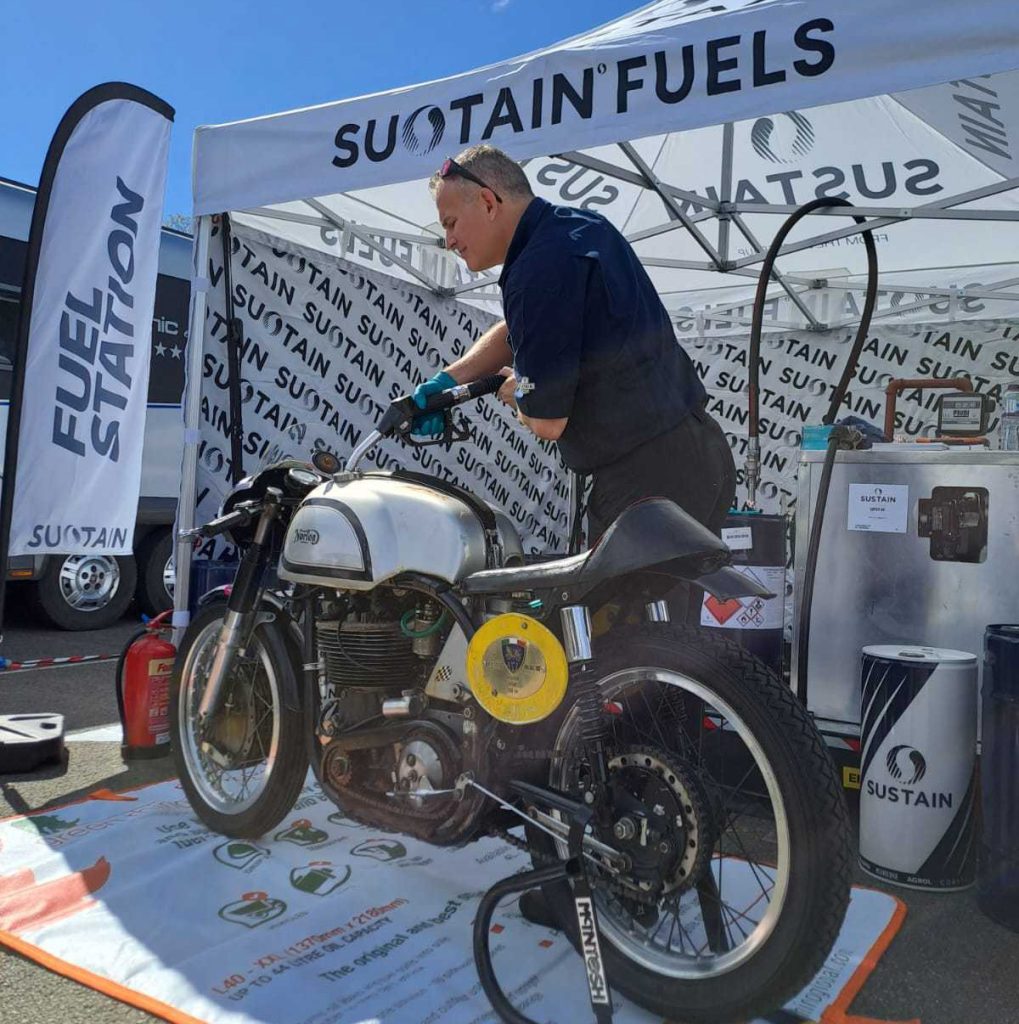
The differences between race fuel and classic car fuel
Both racing and classic car fuels cater for specific engine needs. However, as we’ll explore below, various factors differentiate the two.
| Race fuel | Classic car fuel | |
Audience | Race fuels are primarily used by:Professional racing teamsAmateur racers Owners of modified vehiclesMotorcycle racers | Classic fuels tend to be used by:Veteran, vintage and classic vehicle owners/racersMotorcycle ownersThe marine communityWider motorists |
Purpose and performance | Designed specifically for high-performance engines used in motorsports, racing fuels are engineered to maximise power output, combustion efficiency, and engine durability under extreme conditions. | Fuels for cars, formulated to suit the lower-compression, less advanced engines of earlier eras. These fuels may need to replicate properties of fuels from the past, like higher lead content or different octane levels, to ensure the car runs smoothly without damaging engine components. |
| Octane rating | Race fuels tend to have a significantly higher octane rating compared to regular fuel, often exceeding 100. This higher rating allows the fuel to withstand the extreme pressures and temperatures in racing engines without causing engine ‘knock’. | For classic car fuel, the octane requirements vary depending on the engine design. Many vintage cars were designed to run on lower-octane fuel (e.g., 87 to 93). |
| Additives | Race fuel typically contains performance-enhancing additives, such as oxygenates (like ethanol or methanol) to improve combustion efficiency, cooling properties, and power delivery. | Classic car fuels often need additives to compensate for modern fuel changes. For example, many older cars originally ran on leaded fuel, so modern unleaded fuels might require lead substitutes or other additives to protect engine components like valves and seals. |
| Engine compatibility | Race fuels are not typically suitable for daily-driving vehicles or vintage cars, as they are optimised for short bursts of high performance, not for engine longevity or efficiency at low speeds. | Classic car fuels prioritise engine preservation. Older engines may not be compatible with ethanol blends or modern fuel formulations that can cause corrosion or degradation of fuel lines, seals, and carburettors. |
As we’ve outlined above, there are many differences between racing and classic fuels. Understanding these differences, and the strengths and challenges each category presents, will ensure you pick the right product for the right situation.
If you’d like to read more about SUSTAIN Racing fuels or Classic fuels, please visit our product pages. Alternatively, check out our education hub for further fuel-focused articles.



